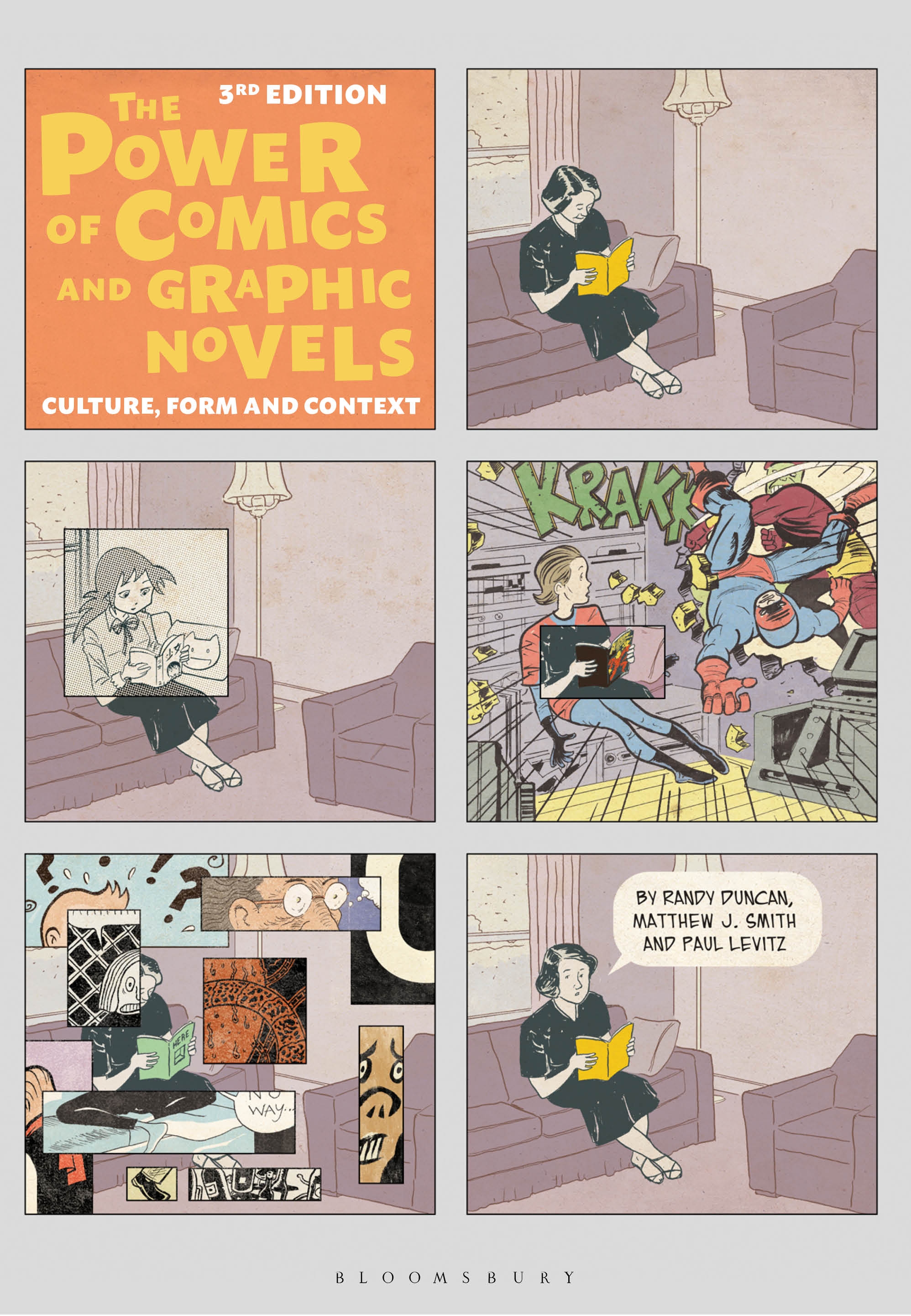


Are you sure you want to reset the form?
Your mail has been sent successfully
Are you sure you want to remove the alert?
Your session is about to expire! You will be signed out in
Do you wish to stay signed in?
The Power of Comics and Graphic Novels:
Culture, Form, and Context (3rd edition)
Fully revised and updated in this third edition, The Power of Comics and Graphic Novels remains the most authoritative introduction for studying comic books and graphic novels, covering their place in contemporary culture, the manifestations and techniques of the art form, the evolution of the medium, and how to analyze and write about them.
The new edition includes:
· Completely reworked introductory and history chapter, exploring the US and global comics community and the role many communities played in advancements of the medium and comics studies.
· Chapters reframed to get students thinking about themselves as consumers and makers of comics.
· Reorganized chapters on form to unpack encapsulation, composition and layout.
· Completely new chapters on writing about comics and the use of comics to report, document, and persuade.
· A new preface by archivist Karen Green and a cover by award-winning writer/artist Sonny Liew.
The Power of Comics and Graphic Novels is illustrated throughout, with an extensive glossary of key terms and discussion questions and activities for every chapter.



Matthew J. Smith is Dean of the College of Humanities and Behavioral Sciences and Professor of Communication at Radford University, USA, where he teaches the introductory Comics Studies course. Along with Randy Duncan and Christy Knopf, he is a co-editor of the Routledge Advances in Comics Studies Series and co-curator of the traveling exhibition, Marvel: Universe of Super Heroes.
Email Dr. Smith on smith_matthew@hotmail.com.

Paul Levitz is a former President and Publisher of DC Comics and has written for many of DC's major comic books series, including Superman and Justice Society. His story Legion: The Great Darkness Saga was voted one of the top 20 best comic stories of the last century by readers of The Buyers' Guide. He teaches a course in the American Graphic Novel at Columbia University and was named to the Will Eisner Award Hall of Fame in 2019.
Contributors
Karen Green is Curator for Comics and Cartoons at Columbia University. Since 2005 she has been instrumental in building a comics collection and archive that now includes the original art and paper of Chris Claremont, Al Jaffee, Howard Cruse, Jerry Robinson, S. Clay Wilson, Wendy and Richard Pini, and Kitchen Sink Press, among others. Karen is highly active and visible at comics conferences and conventions, has been a judge for the Eisner Awards and the Pulitzer Prize in Editorial Cartooning, and she co-produced the documentary She Makes Comics (2014). She has also organized and hosted numerous online conversations with comics artists. In 2107 Nick Sousanis created the Eisner-winning “A Life in Comics: The Graphic Adventures of Karen Green” for Columbia Magazine.
Charles Hatfield (California State University, Northridge) is the author of Hand of Fire: The Comics Art of Jack Kirby (2011) and Alternative Comics (2005), co-editor of Comics Studies: A Guidebook (2020) and The Superhero Reader (2013), and curator of Comic Book Apocalypse: The Graphic World of Jack Kirby (2015). He co-founded and served as inaugural president of the Comics Studies Society and has served as co-organizer for both the International Comic Arts Forum and the MLA Forum on Comics and Graphic Narratives.
William B. Jones, Jr., is the author of Classics Illustrated: A Cultural History, Third Edition (2023) and the award-winning Petit Jean: A Wilderness Adventure (2016); he is also a contributor to The Oxford Handbook of Adaptation Studies (2017). Jones has written introductions for reissued Classics Illustrated editions, published CI-related articles in such venues as the Journal of Stevenson Studies and Verniana, and spoken on Classics Illustrated at the Library of Congress and at literary conferences from Scotland to California.
Sonny Liew’s multi-Eisner winning The Art of Charlie Chan Hock Chye was a New York Times and Amazon bestseller, and the first graphic novel to win the Singapore Literature Prize. Other works include The Shadow Hero (with Gene Luen Yang), Doctor Fate (with Paul Levitz), Red Lines (with Cherian George), The Pandemic Cookbook (with Hsu Li Yang) and Malinky Robot, as well as titles for Marvel Comics, DC Comics, Vertigo, Boom Studios, and Disney Press.
Carl Potts was Executive Editor for most of his 13 years at Marvel Comics, overseeing a third of Marvel’s publications. At Marvel, Potts discovered and mentored many top comics creators. He wrote and drew for a variety of comics titles. Potts also created the Alien Legion series and the Last of the Dragons graphic novel for Marvel’s Epic imprint. He currently teaches at School of Visual Arts and Academy of Art University while consulting for marketing and entertainment clients. Potts’ book, The DC Comics Guide to Creating Comics: Inside the Art of Visual Storytelling was published by Watson-Guptill (Random House) in 2013.
Elisabeth (Lisa) El Refaie is Reader in Visual Communication at Cardiff University. She has published widely on visual and multimodal forms of narrative and rhetoric, including in her two monographs, Autobiographical Comics: Life Writing in Pictures (2012) and Visual Metaphor and Embodiment in Graphic Illness Narratives (2019). In recent years, she has developed and run workshops that encourage people to share their views and emotions on sensitive topics by creating their own visual metaphors (drawingout.uk).
Table of Contents
ACKNOWLEDGEMENTS
PREFACE BY KAREN GREEN
INTRODUCTION
Unit I: Culture
1 Comics in Culture, Comics as Culture
2 Making and Reading Comics
Unit II: Form
3 Encapsulation of the Moments
4 Composition of the Panels
5 Layout of the Pages
Unit III: Genre
6 Genres of Comics
7 Memoir Comics
8 Superhero Comics
9 Beyond Entertainment: Journalism, Documentary, and Advocacy
Unit IV: Context and Analysis
10 The Evolution of American Comics
11 Exploring Meanings in Comics
12 Writing about Comics
GLOSSARY
BIBLIOGRAPHY
INDEX